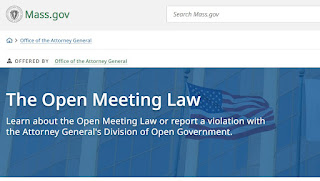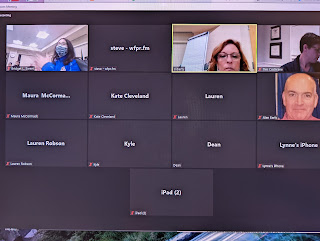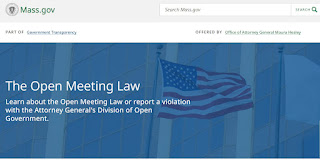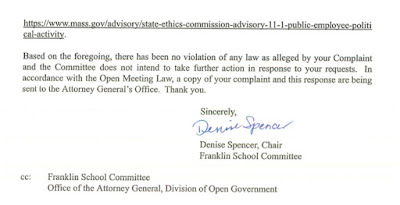 |
| Mass. AG: Why I filed a lawsuit to enforce housing law — and why it’s personal for me |
Providing accurate and timely information about what matters in Franklin, MA since 2007. * Working in collaboration with Franklin TV and Radio (wfpr.fm) since October 2019 *
Friday, January 30, 2026
Mass. AG: Why I filed a lawsuit to enforce housing law — and why it’s personal for me
Friday, December 5, 2025
Heat requirements & renters rights reminder from Mass Attorney General's Office
 |
| Heat requirements & renters rights reminder from Mass Attorney General's Office |
Sunday, June 8, 2025
Boston Globe: "Attorney General Andrea Campbell issued guidance on Thursday for Massachusetts immigrants and their supporters"
"Attorney General Andrea Campbell issued guidance on Thursday for Massachusetts immigrants and their supporters on how to respond to federal immigration officials, as arrests have sharply increased in the state.The guidance addresses questions her office has received about ICE’s jurisdiction, the rights of people being targeted, what bystanders are allowed to do, and whether local law enforcement can cooperate with federal officials.
It comes as Campbell has said there is little she or other local politicians can do to stop the ICE arrests taking place under the Trump administration.“From arresting parents in front of their children to pulling people who present no public safety threat out of their cars in broad daylight, the aggressive ICE tactics we’re seeing across the Commonwealth do not protect the public, and instead spread fear,” Campbell said in a statement. “In releasing this guidance, I strongly encourage everyone to inform themselves of their rights when they see immigration officers in their communities.”
Friday, January 24, 2025
Boston Globe: AG Campbell co-sponsors bill to ban cell phone use in Mass. public schools
"Attorney General Andrea Campbell is joining the growing nationwide push to crack down on students' cell phone use during school hours.Campbell spoke before the Massachusetts Association of School Superintendents Thursday about her efforts to shield children from the harmful effects of social media, one week after she, along with several state lawmakers, filed legislation that aims to impose a “bell-to-bell” ban on personal cell phone use at all Massachusetts public schools during class time. Called the “STUDY Act,” it also would require social media companies to implement additional health and safety policies.“By restricting cellphones during the school day and raising the bar for social media companies, we are taking bold steps to create learning environments free from distraction and a digital landscape that prioritizes the well-being of our youth,“ Campbell said in a statement last week. ”This bill is a commitment to both education and mental health for our young people, ensuring they have the tools to succeed without unnecessary harm.”
Saturday, November 2, 2024
State Representative Jeff Roy rolls out 2024 endorsements
“I am proud to endorse Rep. Jeff Roy for re-election as the State Representative for Franklin and Medway. He has been a partner and champion on climate and energy issues, spearheading efforts to pass landmark climate and energy bills, as well as legislation to address substance use disorder, economic development, and civil rights. And he has consistently delivered critical local aid to Franklin and Medway. I look forward to continuing to partner with him."
“Representative Roy has been a highly effective and skilled legislator for more than a decade, advancing important laws addressing education, economic development, healthcare, criminal justice, and civil rights. In his role as Chairman of the Telecommunications, Utilities and Energy Committee, Jeff spearheaded efforts to pass landmark climate and energy legislation to legislation strengthening protections for survivors of abuse and exploitation. His district and the Commonwealth will benefit from his continued leadership at the State House."
“has been a partner in the work, including protecting our environment and addressing climate change. With significant local and state government experience, he is passionate about getting things done and having an impact on all of his constituents, including his seniors, students, and those often forgotten.”
“deeply appreciates your past support for law enforcement and your commitment to public safety in the Commonwealth. Your proven leadership and dedication aligns perfectly with our mission to ensure the safety of our communities and the well-being of our members.”
“The Massachusetts AFL-CIO Executive Council has officially voted to endorse your re-election. On behalf of nearly half a million members across the Commonwealth, we are proud to support candidates like you who have demonstrated a commitment to the values and principles of the Labor Movement, and create an economy that works for working people.”
Saturday, September 16, 2023
Franklin Police recognized by State for Investigation Assistance in Prescription Fraud And Illegal Distribution Scheme
"Attorney General Andrea Joy Campbell’s Office has indicted an individual for impersonating physicians to illegally obtain prescription drugs and then selling those drugs for profit as part of an elaborate drug diversion scheme. The indictment follows a joint investigation by the AG’s Medicaid Fraud Division, Norfolk County District Attorney’s Office and Franklin Police Department.Pascal Girault Jr., also known as Pascal Schnaider Jr. Girault, age 21, of Stoughton, was indicted on Monday, September 11, 2023, by the Statewide Grand Jury in Suffolk Superior Court on 10 counts, including possession with intent to distribute a Class E substance, identity fraud, Medicaid false claims and uttering false prescriptions.The AG’s Office alleges that between September 2021 and May 2022, Girault routinely called pharmacies within Norfolk, Suffolk, and Middlesex County with stolen physician identifications and posed as a physician or a member of the physician's staff to obtain prescriptions for promethazine and promethazine with codeine, which he then sold on the street for profit. The AG’s Office alleges that Girault falsified over two dozen prescriptions, 11 of which were paid for by Medicaid, and in some cases, also obtained azithromycin, an antibiotic commonly known as “Z-Pak”, in an apparent attempt to make his false promethazine prescriptions appear more legitimate."
 |
| Franklin Police recognized by State for Investigation Assistance in Prescription Fraud And Illegal Distribution Scheme |
Friday, March 31, 2023
Governor Healey signs "temporary provisions pertaining to the Open Meeting Law to March 31, 2025"
On March 29, 2023, Governor Healey signed into law a supplemental budget bill which, among other things, extends the temporary provisions pertaining to the Open Meeting Law to March 31, 2025. Specifically, this further extension allows public bodies to continue holding meetings remotely without a quorum of the public body physically present at a meeting location, and to provide "adequate, alternative" access to remote meetings. The language does not make any substantive changes to the Open Meeting Law other than extending the expiration date of the temporary provisions regarding remote meetings from March 31, 2023 to March 31, 2025.
 |
| Governor Healey signs "temporary provisions pertaining to the Open Meeting Law to March 31, 2025" |
Friday, July 1, 2022
MA Attorney General asks DPU to dismiss request for 'renewable' natural gas
Via Priya (https://twitter.com/priyainmass) who is a clean energy attorney @CLF Massachusetts, we share the following Twitter thread:
"Good news: @MassAGO has asked the Department of Public Utilities to
dismiss Liberty Gas’ request for approval to receive so-called “renewable” natural gas (aka biomethane, yet another
dangerous, polluting fuel) for the next 20 years. A thread: 1/6 #MAPoli
Right
now, the DPU is considering what the role of gas companies will be in our clean energy
future, which requires utility companies to present plans for their energy supply. (Spoiler: an ideal plan doesn’t include
any climate-damaging, polluting fuels: just clean
energy). 2/6
Much to no one’s surprise, utility companies presented plans that were fancy pretenses for business as usual.
Liberty Gas was one of these companies, and like others,
its plan relied heavily on using biomethane in its
fuel mix. 3/6
According to @MassAGO, the DPU can’t
approve Liberty’s request
while it’s still investigating the “future of gas” And, by requesting DPU’s approval WHILE the investigation
is happening, Liberty
is trying to bypass thorough
review of biomethane’s impacts. 4/6
We agree with the AG. Reality check: Biomethane used for home heating still pollutes our climate while clogging
and dirtying our air. This isn’t a climate solution,
this is a cover for maintaining the status quo. 5/6
Now, we wait to see what the DPU will do. Utility
companies’ claims, especially regarding biomethane, are highly
doubtful. And it won’t help MA reach
our climate goals – which,
at this point, is a matter of our lives. Stay tuned for what the department decides.
6/6"
Saturday, May 7, 2022
More Perfect Union: 046 - MA Attorney General Candidates (With Quentin Palfrey and Shannon Liss-Riordan) (audio)
"In this episode, the group is joined by two of the candidates running for the position of Massachusetts Attorney General; Quentin Palfrey and Shannon Liss-Riordan. The two discuss their backgrounds in government and law, the issues facing the Mass Attorney General's office currently, what they'd aim to achieve if elected and so much more. "
Audio link -> https://more-perfect-union.captivate.fm/episode/046-ma-attorney-general-with-quentin-palfrey-and-shannon-liss-riordan
 |
| More Perfect Union: 046 - MA Attorney General Candidates |
Wednesday, February 16, 2022
Franklin School Committee statement in regards to OPML complaint
Based on the
foregoing, there has been no violation of any law as
alleged by your
Complaint
and
the Committee does not intend to take further
action in
response to your requests. In accordance with the Open Meeting Law, a copy of your complaint and this response
are being sent to the Attorney General's Office. Thank you.
Sincerely,
Denise Spencer, Chair
Franklin School Committee
Office of the Attorney General, Division of Open Government
Franklin School Committee statement in regards to OPML complaint
Thursday, February 3, 2022
Recap: Board of Health conducts regular business, listens to resident comments on masking
- Board of Health conducted their normal business approving minutes of prior meeting, hearing updates from nurse, epidemiologist and inspector.
- Winter St demolition approvals in process, other abandoned housing being addressed in coordinated manner with attorney general
- problem with ordering at home test kits, not as easy as it was lead to be, no date yet for availability
- multiple residents commented against a mask policy in light of the request at the prior meeting for the Board to consider one.
- Real time reporting for the Board of Health meeting underway, #boh0202 Winter St update provided, prior meeting minutes approved (twice, once 2-0; then 3-0; 3rd member arrived)
- Some audio items on the Zoom bridge worked through to be able to hear folks in the room clearly #boh0202
- Update from inspections, update from nurse, clinics being worked, COVID is still prevalent #boh0202
- Epidemiologist provides updates, working on reporting and tracking, new webpage/dashboard being put together, #boh0202
- At home rest kits ordered from lowest priced vendor, couldn't get ship dates; order cancelled, new being set, no date yet for availability, #boh0202 not as easy as it sounded.
- Property on Union St being worked collaboratively, police, fire, health, building, Attny General office coordinated - working on abandoned housing initiatives and making progress #boh0202
- Open to citizen comment, M Benson speaking to mask mandate discussion from last time to raise several issues, #boh0202 mask mandate would instill a sense of fear, not necessary
- Another citizen, (didn't catch name) anti mask comments, #boh0202 "respect the choice people have" define an exit strategy. D Videra, backing up M and Kevin, also anti mask, tremendous mental health issues, start tracking those in addition toCOVID-19
- Another citizen, (name missed) complaining that the school committee which is also supposed to be apolitical has members that just endorsed Senator Rausch so that doesn't work and is contradictory with other statements being made #boh0202
- No hands raised for other remote comments, #boh0202 Board comments, thanks for the citizen comments, good engagement, good commitment, folks need to stay safe and healthy motion to adjourn, second, passes 3-0 via roll call
Audio recording to be available in a couple of days
 |
| Board of Health conducts regular business, listens to resident comments on masking |
Thursday, December 2, 2021
Open Meeting Law Guidance Spotlight: Subcommittees and Sub-quorum Communications
From the MA Attorney General's Office on Open Meeting Law Guidance:
Guidance Spotlight: Subcommittees and Sub-quorum Communications
This month we offer guidance on the creation of subcommittees under the Open Meeting Law, and permissible communications among members that constitute less than a quorum of a public body. We recognize that public body members want to conduct business efficiently and effectively. However, public body members must exercise caution when communicating and carrying out the public body’s responsibilities outside of a properly posted meeting. The Open Meeting Law prohibits deliberation outside of a posted meeting. “Deliberation” is communication among a quorum on a matter within the public body’s jurisdiction. Because the Open Meeting Law focuses on communications among a quorum, there is no prohibition on communications outside of a meeting that do not involve or reach a quorum of members—as long as the members are not also a quorum of a subcommittee. Therefore, it is important to understand whether members of a public body may constitute a designated subcommittee.
The Open Meeting Law defines “public body” as any “multiple-member board, commission, committee or subcommittee within the executive or legislative branch or within any county, district, city, region or town, however created, elected, appointed or otherwise constituted, established to serve a public purpose.” G.L. c. 30A, § 18. The Law further defines a “subcommittee” as “any multiple-member body created to advise or make recommendations to a public body.” Id. A public body forms a subcommittee when the body formally authorizes multiple members of the public body to advise or make recommendations to the public body. Whether a subcommittee was created hinges on the public body’s action and whether it intended to create a multiple-member body, or whether it intended to assign the task to one person, even if another member of the public body subsequently volunteers to assist. Therefore, if a single member undertakes a task, or multiple members decide on their own to communicate about a matter or prepare a recommendation without having been designated to do so, no subcommittee is created. Furthermore, the name of a group—whether called a subcommittee, a “working group,” a “task force” or something else—will still be subject to the Open Meeting Law if it is a multiple-member body created to advise or make recommendations. Even subcommittees that have members who are not part of the public body will be subject to the Open Meeting Law if they meet the Open Meeting Law’s definition of “public body.”
Subcommittees are public bodies in their own right, which means they must follow all of the Open Meeting Law’s requirements applicable to public bodies. Subcommittee members should be particularly careful about any communications they have with their fellow subcommittee members in order to avoid deliberating outside of a posted meeting, as the subcommittee has its own (smaller) quorum. The quorum of a public body, including a subcommittee, is a simple majority of its members, unless otherwise provide by law. Therefore, although it is generally permissible for public body members to communicate amongst themselves outside of a posted meeting as long as the communications do not involve or reach a quorum (whether concurrently or serially), public body members must always be cognizant of the makeup and quorum of the public body, including any subcommittees on which they serve.
Determinations Regarding Subcommittees and Sub-quorum Communications:
OML 2021-176: Finding no violation of the Open Meeting Law because text message conversations did not contain or reach a quorum of the Board. In all cases, the Board members engaged in one-on-one text exchanges during the meeting. In addition, we find no evidence of serial deliberation among a quorum of the Board.
OML 2021-115: Subcommittee deliberated outside of a posted meeting, in violation of the Open Meeting Law, when a quorum of the Subcommittee discussed the status of a matter that was clearly within the Subcommittee's jurisdiction outside of a posted meeting.
OML 2018-128: Board did not create a subcommittee where the Board took no vote after one member offered to research a topic and another member of the public body subsequently volunteered to assist.
OML 2017-111: Board did not create a subcommittee where the Board clearly intended to assign a task to one person and another member of the public body subsequently volunteered to assist.
OML 2016-96: Working Group did not create a subcommittee where two members of the Working Group, on their own initiative, worked on projects for the benefit of the Working Group, without the Working Group taking any official action to delegate that responsibility to the two members.
For more info on Open Meeting Law visit -> https://www.mass.gov/the-open-meeting-law
 |
| Open Meeting Law Guidance Spotlight: Subcommittees and Sub-quorum Communications |
Saturday, November 6, 2021
Frequently Asked Questions - how to deal with rising heating and utility costs
"Many residents are struggling to pay their bills, including their monthly utility bills. Electricity and Gas are essential services—that’s why it is important that customers know their rights and where they can go for help if they need it."
- English version PDF -> https://drive.google.com/file/d/17QqpZ0o9fkNhv3WBLVJ2jq-KJZYmaqvG/view?usp=sharing
- Spanish version PDF -> https://drive.google.com/file/d/17TQgZmfwrFKlTpi-8APKeA7sFLunvUge/view?usp=sharing
 |
| Frequently Asked Questions - how to deal with rising heating and utility costs |
Sunday, October 31, 2021
MA Open Meeting Law: items of interest on public participation and SEPAC meetings
What about public comment, public participation, and public hearings?
"The Open Meeting Law does not require that public bodies allow public comment or public participation during meetings -- to the contrary, the Open Meeting Law specifies that nobody shall address the public body without permission of the chair. However, the Attorney General encourages public bodies to allow public comment and/or public participation when feasible.
Because the Open Meeting Law does not require that public bodies allow for public comment or public participation during meetings at all, the manner that public bodies may choose to accept comment or questions is outside the scope of the Open Meeting Law.
Public hearings, on the other hand, are governed by separate laws that impose additional requirements, and may require opportunity for public comment or testimony. Those requirements are outside the scope of the Open Meeting Law and therefore do not fall within the Division of Open Government’s jurisdiction. Public bodies and members of the public should consult with legal counsel for guidance on the requirements for public hearings. "
https://www.mass.gov/service-details/updated-guidance-on-holding-meetings-pursuant-to-the-act-extending-certain-covid-19-measures
"While a SEPAC itself is generally not a public body subject to the Open MeetingLaw, the leadership group may be a public body subject to the Open MeetingLaw. Massachusetts law requires that membership in a school’s SEPAC beoffered to all parents of children with disabilities and other interested parties. SeeG.L. c. 71B, § 3. In many cases, the SEPAC establishes or elects a leadership orgoverning committee. That group of elected or appointed officers will likelyconstitute a public body under the Open Meeting Law, and it is thereforeadvisable that such groups comply with the Open Meeting Law’s requirements.
Now that the issue has been formally presented to this office, and after review and analysis of the applicable statutes and regulations pertaining to the establishment of SEPACs as well as the structure and function of SEPACs, we conclude that the Brockton, Brookline, and Melrose SEPACs are not public bodies subject to the Open Meeting Law. We also conclude that whether a SEPAC’s leadership group is a public body depends on the structure and role of that group. We find that the officers of the Melrose and Brockton SEPACs do not constitute public bodies;and that the Board of the Brookline SEPAC is a public body for limited purposes."
Document link -> https://massago.onbaseonline.com/Massago/1700PublicAccess2/PublicAccessProvider.ashx?action=ViewDocument&overlay=Print&overrideFormat=PDF
 |
| Learn about the MA Open Meeting Law or report a violation with the Attorney General's Division of Open Government |
Thursday, September 2, 2021
CommonWealth Magazine "Legalization of happy hours, fireworks among approved ballot questions" for 2022
"ATTORNEY GENERAL Maura Healey’s office allowed 17 proposed laws and constitutional amendments dealing with a wide variety of public policy issues to keep moving toward the ballot on Wednesday.
Assuming sponsors can gather 80,239 signatures, Massachusetts voters will be asked in 2022 to decide whether fireworks and turbocharged happy hours should be legalized. They will decide whether retailers should be able to hold more liquor licenses, whether much higher rebates on zero emission vehicles should be offered, and whether to prohibit taxes, fees, and other measures “that would reduce or restrict the supply” of motor fuels – a question filed by Republican Rep. David DeCoste of Norwell that appears to be targeted at blocking Gov. Charlie Baker’s transportation climate initiative."
 |
| CommonWealth Magazine "Legalization of happy hours, fireworks among approved ballot questions" for 2022 |
Thursday, June 17, 2021
MA Attorney General: Update on the Open Meeting Law
|





